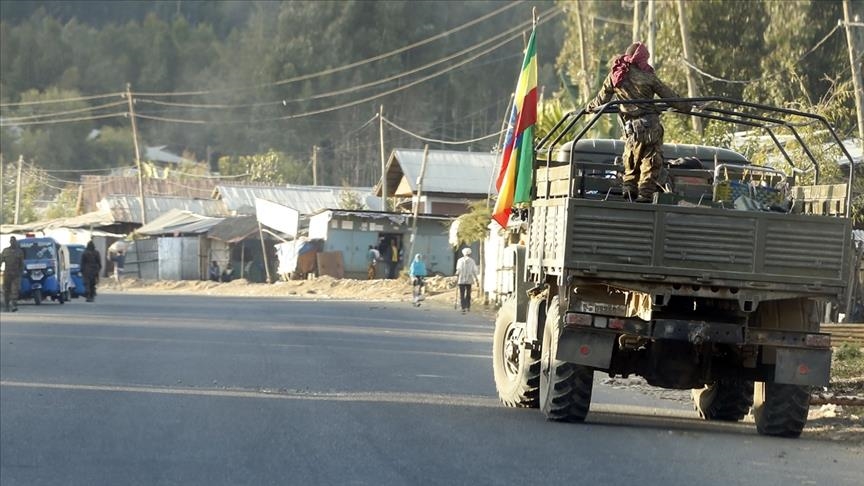West behind continued fighting in northern Ethiopia: Scholar
Amid resumed clashes between Ethiopian gov't forces, Tigray rebels after 5-month truce, scholar says West laid groundwork for conflict

ADDIS ABABA, Ethiopia
Recent hopes for peace in Ethiopia's northern Tigray region have largely been dashed, with armed conflict resuming last week between Ethiopian government troops and rebel forces as one scholar says the war is "sponsored by the West."
Tewodros Zewdu Asfaw, a researcher on mixed identities in Ethiopia who is pursuing a doctorate degree at York University, argues that the West is behind the conflict in the Horn of Africa nation, where fighting broke out in November 2020 when forces of the Tigray People's Liberation Front (TPLF) attacked bases of the federal army stationed across the northern region.
In March this year, the Ethiopian government announced a humanitarian truce, which was broken on Aug. 23 when heavy fighting erupted again between the two sides.
"The war in the north, I believe, is sponsored by the West," Tewodros told Anadolu Agency, tracing the friendship between the TPLF and US government back to 1991, when the guerilla force, enjoying widespread support in Ethiopia, reached the capital Addis Ababa after defeating the regime of Col. Mengistu Haile Mariam.
He accused the West of helping the TPLF establish and consolidate its power in Ethiopia, adding that before the main rebel factions arrived at a London peace conference in 1991, then-US Assistant Secretary of State for Africa Herman Cohen, who was chairing the meeting, told the sides: "No democracy, no cooperation."
"While democracy needed to be conducted on a one-man-one-vote basis, the ethnic system they constituted did not allow for this in practice because an ethnically fragmented society was created in which the TPLF represented a constituency of 5 million people," Tewodros explained.
"Hence the TPLF, being the victim of its own ethnic-driven policy, had to opt for force at any given time to stay in power. That is at the root of the conflict in northern Ethiopia today," he said.
According to Tewodros, for peace to prevail in Ethiopia, an all-inclusive national dialogue should be conducted, with the elites demonstrating due “honesty” in the process, and he wished to be part of that national conversation to try and contribute to that.
The TPLF ruled Ethiopia for 27 years at the head of a four-party coalition called the Ethiopian People’s Revolutionary Democratic Front (EPRDF). Its ouster in 2018 followed successive years of anti-government protests waged mostly by the youth across the country.
After the formation of the now-ruling Prosperity Party in December 2019, the TPLF retreated into Tigray, where it re-established itself, as it rejected becoming a part of the new political bloc led by Prime Minister Abiy Ahmed and comprising of the other three parties in the EPRDF.
Grim realities of war
Amid the humanitarian decline that northern Ethiopia today faces, both the government and rebels are trading blame for the fresh fighting that erupted immediately after the UN's World Food Program accused the TPLF of looting 570,000 liters of fuel in Tigray's capital Mekele that was meant for humanitarian aid distribution efforts.
On Wednesday, the Ethiopian government claimed that the TPLF had opened new war fronts in northwestern parts of the country, a significant expansion of the conflict that was limited to just the Kobo front in the eastern Amhara region to areas bordering Sudan.
"The battles are fierce and the TPLF mobilized children and teens," an eyewitness told Anadolu Agency, requesting not to be identified.
Meanwhile, the World Health Organization's Director-General Tedros Adhanom Ghebreyesus, who himself hails from the restive Tigray region, told a media briefing in Geneva: "I will tell you my own story. I have many relatives there. I want to send them money, but I cannot."
He has been vocal in his criticisms of the Ethiopian government for the past couple of years. For its part, Addis Ababa has accused him of breaching the responsibility of a UN high office in an "unethical" manner.
There had been a lull in the war since March after the government declared a unilateral truce following nearly two years of fighting.
The TPLF rejected talks under the mediation of the African Union, while the government insists that this remains the only avenue for dialogue.
Thousands of people, mostly civilians, have been killed and millions other displaced since the armed conflict began in November 2020, with the UN blaming both sides for the deaths.
The UN has warned that Tigray "stands on the edge of a humanitarian disaster," with more than 40% of the region's estimated 6 million people in need of emergency assistance, while millions in the neighboring Amhara and Afar regions have been left homeless and in need of food aid.
Anadolu Agency website contains only a portion of the news stories offered to subscribers in the AA News Broadcasting System (HAS), and in summarized form. Please contact us for subscription options.







